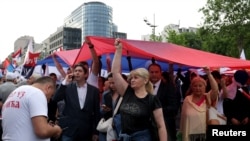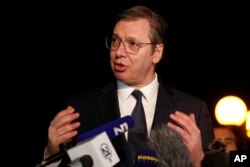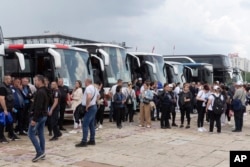Tens of thousands of people converged on the Serbian capital on Friday for a major rally in support of President Aleksandar Vucic, who is facing an unprecedented revolt against his autocratic rule amid the crisis triggered by two mass shootings that stunned the nation.
The event was somewhat overshadowed by a new crisis in Serbia's former province of Kosovo, where ethnic Serbs clashed with Kosovo police on Friday and Vucic ordered Serbian troops to be put on a "higher state of alert." Vucic also said he ordered an "urgent" movement of Serbian troops to the border with Kosovo, which declared independence in 2008.
Answering Vucic's call for what he called "the largest rally in the history of Serbia," his supporters, many wearing identical T-shirts with his portrait, were bused to Belgrade from all over the Balkan country as well as neighboring Kosovo and Bosnia.
Those working in state firms and institutions were told to take a day off from work to attend the rally in front of the parliament building. Some said that they were warned that they could lose their jobs if they didn't show up on the buses, which started arriving hours before the gathering was to start.
Serbian officials said the rally promotes "unity and hope" for Serbia.
At three large anti-government protests held earlier this month in the capital, demonstrators demanded Vucic's ouster and the resignation of two senior security officials. They also demanded the withdrawal of broadcasting licenses for two pro-Vucic television stations that they say promote violence and often host convicted war criminals and other crime figures.
Opposition protesters blame Vucic for creating an atmosphere of hopelessness and division in the country that they say indirectly led to the May 3 and May 4 mass shootings that left 18 people dead and 20 wounded, many of them schoolchildren who were gunned down by a 13-year-old schoolmate.
Vucic has vehemently denied any responsibility for the shootings, calling organizers of the opposition protests "vultures" and "hyenas" who want to use the tragedies to try to come to power by force and without an election.
"They are not against violence, they want my head," he said.
Analysts believe that by staging the mass rally, Vucic, who has ruled the country for more than a decade with a firm grip on power, is trying to overshadow the opposition protests with the sheer number of participants.
"For the first time, Vucic has a problem," said political analyst Zoran Gavrilovic. "His problem is not so much the opposition, but Serbian society that has woken up."
During the rally, Vucic is expected to announce he is stepping down from the helm of his Serbian Progressive Party and forming "a movement" that will unite all "patriotic forces" in the country. He also could call for a new parliamentary election for September — something unlikely to be accepted by the opposition under the current conditions where he has full control over all pillars of power, including the mainstream media.
Vucic, a former pro-Russia ultranationalist who now says that he wants to take the country into the European Union, has alleged that "foreign intelligence services" are behind the opposition protests. He said that he received the tip from "sisterly" spy agencies "from the east" — thought to mean Russia.
There are widespread fears that violence could erupt during the rally on Friday that could then be used as a pretext for a crackdown on future opposition protests, including one that is scheduled in Belgrade on Saturday.
Similar big rallies were held in Serbia in the early 1990s when strongman Slobodan Milosevic delivered fiery speeches that heralded the violent breakup of Yugoslavia and rallied the masses for the wars that followed.






